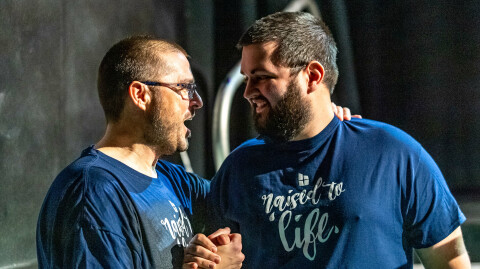When we were asked to present at Parent U a couple of years ago on the topic of Preteens, I remember thinking, “Yeah, we can do that!” We are through that phase with our teenagers, we’d have fun sharing ways we raised our son, Andrew, and daughter, Ainsley through their phase. Then we started reading, praying, and preparing, and our thoughts quickly turned to, “No, we can’t present on this! We’ve done it all wrong!”
But isn’t that how it goes? The more we learn, the more we wish we could do-over? Fortunately, through the process, we were able to reflect on some truly treasured memories and opportunities to coach and shape our preteens as well as some ideas we would definitely put into place if we could go back in time. We thought we’d share a few with you.
Our Family
First, a little about us. Carl is a middle school social studies teacher and has had many, many, like more than 20, years teaching middle school. Jen is a former middle and high school English teacher who, while working on her doctorate, studied adolescents and what motivates and engages them. Understanding the development (body, brain, and spirit) of our early adolescents is helpful. Our son, Andrew, is now at the University of Nebraska-Lincoln studying business leadership and is in the Naval Reserve Officer Training Corps (NROTC). Supporting Andrew through his preteen and into his teen years provided much joy and many lessons. Our daughter, Ainsley, is a junior at Eastview and is currently navigating, like so many other kids, high school during a pandemic. I, Jen, was blessed to watch her Dad prioritize quality time with her as she moved through these formative years.
Lessons affirmed and learned
Pay attention to the development of the brain and shift parenting to support it.
A child in pre-adolescence is going through changes in their brains. For example a child at this age uses more complex thinking focused on personal decision-making in school and at home. He or she will begin to use formal logical operations in schoolwork. A personal favorite (not really) is that kids at this age will begin to question authority and society standards as well as form and speak his or her own thoughts and views on a variety of topics. You may hear your child talk about which sports or groups he or she prefers, what kinds of personal appearance is attractive, and what parental rules should be changed. Brains are malleable and ever-changing, so we do want to use our caregiver responsibilities to ensure healthy brain development. We can do that by:
-
Including our children in discussions about a variety of topics, issues, and current events,
-
Encouraging the sharing of ideas and thoughts with you
-
Encouraging independent thinking and developing new ideas
-
Assisting in setting goals
Prepare your kids for the physical changes they are about to encounter.
It’s so important to prepare our preteens for the physical changes they will be headed into during puberty. Fortunately, we don’t have to have all the answers. Carl and I turned to books to help us. For Andrew, we also had the blessing of a small group with couples all raising boys Andrew’s age. We did a book study together studying Bringing up Boys by James Dobson. As his father, Carl also took the time to have honest conversations one on one with Andrew about what to expect as his body changes and hormones kick in. For Ainsley, two books really helped equip her mom to have practical and spiritual conversations with her. One practical and the other spiritual. Hello Flo, the Guide. Period by Naama Bloom was a great book that Ainsley could peruse on her own, and we could look at together. It takes a humorous and blunt approach to what she will experience physically. I often started our conversations with, “this might feel uncomfortable, but with your mom you can ask or talk about anything.”
Raising a Modern-Day Princess by Pam Farrel and Doreen Hanna is a nice compliment and focuses on so much more than the physical changes. What I love most about this book is that it offers practical help in raising young women to see themselves as God sees them—as daughters of the King.
Take time to understand the spiritual phases young people walk through and meet them where they are.
Philippians 4:13 is a life verse for the Plucker family. Whenever things get tough, we can just hold up our 10 fingers and say “I can do all things through Christ who strengthens me.” Andrew adopted his own life verse which helps to ground him when the earth shakes just a bit too much. Psalm 23:4 “Even though I walk through the valley of death, I will fear no evil, for You are with me. Your rod and Your staff, they comfort me.” I noticed recently that on Ainsley’s Instagram account, she too has this Psalm. Our young people are fully capable of strong relationships with Christ and are prime to grow in their faith. It can be helpful for us as we disciple our children to understand the phases of spiritual growth. Theologian James Fowler, tells us that at this age, most kids are in stage two, Mythic-Literal Faith:
In the Mythic-Literal stage, “the person begins to take on for him- or herself the stories, beliefs, and observances that symbolize belonging to his or her community” (Fowler, 149). Faith stories are logical, concrete, and literal. A Stage 2 faith has learned to distinguish real and make believe. Justice is based on fairness, with rewards and punishments given based on adherence to moral rules. The person in this stage is better able to take on the perspectives of others. God is thought of in anthropomorphic terms, described with human qualities and actions. This stage is mostly found in school-age children, but some adults will remain in this stage (Lexington Avenue Baptist Church)
It can be really helpful to understand all of the phases, however, as individuals can move to stay in phases at varying rates. An added bonus of exploring Fowler’s work was the reflection we (Carl and Jen) had of our own spiritual growth journey.
Schedule regular, one-on-one time and plan a road trip with your preteen.
Berean has a comprehensive family discipleship plan. One of the milestone’s is Preteen Passage and it is recommended to take a road trip with your preteen. According to the Berean family ministry page, “Between the ages of 10 and 12, kids undergo a lot of physical, emotional, and cognitive changes. As a parent, your task is to prepare your child spiritually, emotionally, and physically for those changes. You’ll teach your child to navigate new realities and thought processes in the context of a personal relationship with Jesus Christ. We will equip you to discuss topics related to physical changes, current culture, personal identity, and a prevailing faith as you prepare your child for life as a teenager.”
Berean recommends that this phase be conducted father/son and mother/daughter, but in our case, we ended up doing it the opposite. Andrew earned a spot at the National History Bee in Atlanta the very same weekend our daughter was going to be honoring her dad at a Twin’s Game as her 5th-grade essay earned him a Father of the Year finalist award from the Center on Fathering. While it seemed natural that a history teacher would accompany his son to the National History Bee, Carl couldn’t really not be with his daughter to receive his award. So we spent the weekend apart--Jen and Andrew in Atlanta and Carl and Ainsley in downtown Minneapolis.
While unintended, the benefits of the mother/son and father/daughter trips were plentiful and the memories made irreplaceable. The bonds created, we believe, led to trust for future conversations. If we could go back in time, we would have more closely followed the guide provided by Berean (we didn’t know it was there) and we would have also made time for mother/daughter and father/son intentional trips focused on the tips provided by Berean for this important milestone.
What We Know Now
Like I said at the beginning of this post, the more we learn, the more we wish we could do-over. That's life, right? All I can say, to those parents out there who are in the trenches, raising pre-teen kids, is keep on getting back up. Keep learning. Keep talking to your pre-teen, and keep seeking God. You won't do everything right, and like us, over time you will look back and wish you could go back and try some new ideas you now know about. However, you'll also remember some treasured memories and the ways you were able to build a relationship with your pre-teen while shaping and coaching them through it.



